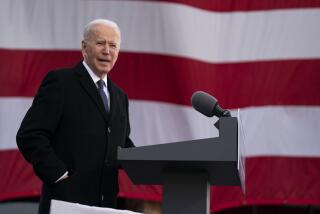Gore Proposes Coverage for Cancer Tests for Elderly
- Share via
ATLANTA — Renewing his pledge to lead a war on cancer, Al Gore on Thursday unveiled a plan to help elderly Americans get new preventive tests promised by the Human Genome Project.
On a campaign stop at Emory University’s Winship Cancer Institute, the vice president proposed offering Medicare coverage for cancer detection tests as new research--including the mapping of the human gene sequence--makes them available.
The new coverage for the elderly was one of several proposals that Gore announced Thursday to expand the $9-billion cancer-fighting agenda that he released last year.
Evoking President Kennedy’s 1961 pledge to put a man on the moon by the end of the decade, Gore told scores of doctors and researchers that within 10 years, “no one in America should have to die from colon cancer, breast cancer or prostate cancer.
“Certain forms of these diseases may be beyond our reach in the short term, and we may not get there. But of this much we can be certain: If we don’t set the goal, we’ll never get there.”
In a week when the presumed Democratic nominee for president is promoting his “family agenda” and spotlighting his personal background, Gore also alluded to the 1984 death of his sister, Nancy Gore Hunger, of lung cancer at age 46.
“I know from my own family’s experience what cancer can do to a family,” he told the group of several hundred people, many of them in white lab coats, gathered on a campus lawn.
Frank Hunger, the widower of Gore’s sister, flew with the vice president to Atlanta on Air Force Two to attend the event.
Before his speech, Gore visited cancer-stricken children at a nearby pediatric hospital. Several of the youngsters had lost their hair in chemotherapy. Gore frolicked with them in a playroom, getting down on his hands and knees to chase one toddler under a table.
Cancer is the second-leading cause of death in the United States after heart disease. The American Cancer Society projects that 552,200 Americans will die of the disease this year.
Under the $9-billion package of cancer proposals that Gore released in 1999, the government would double funding for cancer research over five years and increase fivefold the number of cancer patients eligible for potentially lifesaving clinical trials at the National Cancer Institute.
On Thursday, he proposed adding what aides said was $1 billion in additional spending on cancer-related programs. They included an expansion of Medicaid coverage for detection and treatment of colon cancer and new research on racial and ethnic disparities in the incidence of cancer.
Gore dwelt most, however, on the proposed Medicare funding for cancer prevention tests, including those that could be spawned by the genome research project. Gore compared the project’s expected success in the weeks ahead to the cracking of the Nazi code during World War II, saying it would “turn the tide” on fighting cancer.
Comparing Kennedy’s call for moon exploration with the challenges of fighting cancer, he said: “Well, today we have the capacity to reach inward, deep within the DNA of the human body to see the blueprint not only of humankind but also the blueprint of cancer.”
Gore’s proposal calls for a panel of experts to review all new techniques to prevent and detect cancer. It would decide whether Medicare coverage is warranted and cost-effective, then make a recommendation to the secretary of Health and Human Services. The secretary would decide whether to approve any new coverage but could be overruled by a vote of Congress.
To some Emory University doctors who listened to Gore outline his plans, the most significant element was the doubling of research funding. “That will really have a big impact on our progress if we can really do that,” said Dr. Chuck Packos, a cancer researcher.
* MEMO NAMES GORE
An unsigned memo suggested Al Gore could help a political backer win a contract. A25
More to Read
Get the L.A. Times Politics newsletter
Deeply reported insights into legislation, politics and policy from Sacramento, Washington and beyond. In your inbox twice per week.
You may occasionally receive promotional content from the Los Angeles Times.










